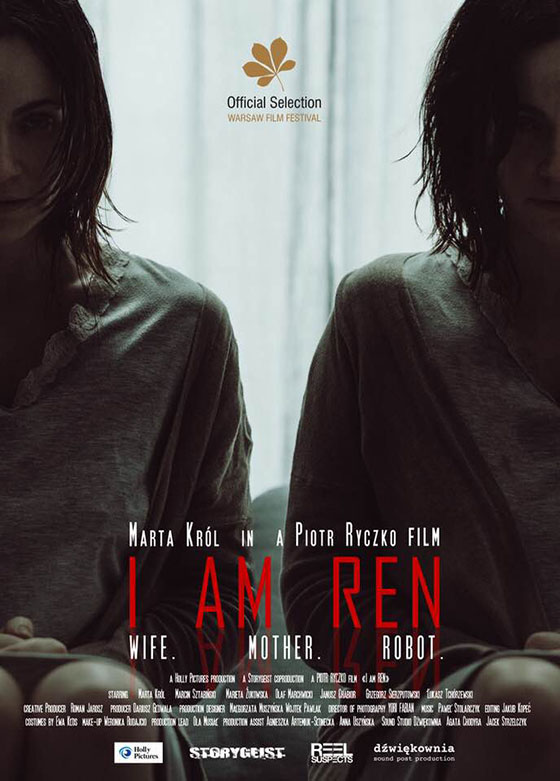I AM REN *** Poland. 2019. Dir: Piotr Ryczko. 75 mins

Hack attacks on large companies, institutions; even countries, are part of organized warfare. The idea of how to deal with everyday tech is dealt with astonishing melancholia in the Polish film I AM REN (2019), also known as JESTEM REN and PANCACEA. This stylish Cold War, science fiction thriller pits humans against machines for a reason other than the usual conquest scenarios. In I AM REN (2019), the battle becomes human against human, set against the background of one family. What is at stake? The toppling of a regime? Or the turning off of one machine?
The picture opens showing the Wirskirska family – father Jan (Marcin Sztabinski), mother Renata (Marta Król), and son Kamil (Olaf Marchwicki). They are living in a relatively upscale isolation in a lake house in present day Poland. The family is loving in and somewhat successful. Renata appears to be integrated with their smart home to the point of one sided sexual relations. Renata goes through the motions while Jan feels the pleasure. Renata and Kamil are also prisoners in the home as several gates are locked when Jan leaves for work.
One night Jan returns from work to find Renata bruised and their son in a state of shock in his ransacked bedroom. Neither can explain what happened. Jan suspects Renata of having a violent breakdown. Kamil will no longer be close with her, refusing to hold hands. He keeps asking why it happened.
Jan suggests they go to family therapy. Afraid at first, Renata accepts the sessions. During the session with the psychologist, Renata informs the doctor that her name is REN and that she is a prototype of artificial intelligence: an error-free machine. REN does not commit crimes or act out of the ordinary, yet the incident happened. Renata is acceptable technology in the society with the rule that automatons who exhibit violent behavior are shut down and replaced. Renata is an Artificial Intelligence parent and the family opts for treatment at an unnamed high tech compound to see if she is still fit to be a surrogate mother for the troublesome Kamil. But events take an unexpected turn when Renata discovers the true nature of her problem, and who she really is.
Jan and Kam have a hard time accepting that Renata is violent. During the course of sessions at the compound Renata soon starts to wonder if she can trust her memories. No ‘Mother’s little helper ‘here. Even perfect tech can be overwhelmed with false or misleading information.
One sequence brings light to a possible conspiracy theory for Renata and AI Ela (Marieta Zukowska). All is not as it seems. The two blend well together in their moment on screen. Renata causes an emotional breakdown in Ela in front of the staff.
Marta Król is strong in the role of Renata. She plays her with warmth and empathy. This means that Renata feels completely genuine when speaking with her human therapist (Janzus Chabior); the emotion is never a put-on, especially when the facts dawn on her. No over the top emoting or Blade Runner twitching deaths with sparks in this one. Krol won the Best Actress award for this picture when it was screened at the Trieste Science Fiction festival in 2019. The cast work well together, allowing Krol to work and play off the emotions given or fill the space when needed.
Director Piotr Ryczko creates a nice, clean near-future world, keeping things familiar enough to not alleviate the viewer. The picture is shot with the natural beauty of the seasons, distorted scenes of violence, and tension filled rapid cut escapes and wide shots contrasting the coldness of a compound by Yori Fabian. The film is paced to match – you find yourself slowly moving into the story. One wonders that because this picture is from Poland with its Cold War history, if that did not have something to do with the prevailing themes of theft, deception, and threatened replacement of people who undertake violence against the State. I AM REN (2019) deserves a look, even by those that do not like subtitled films, for its effect on people and its subtle yet direct story.
Review by Terry Sherwood

